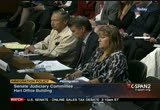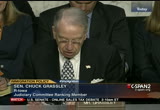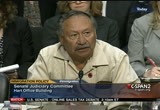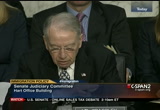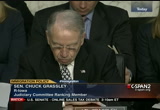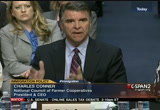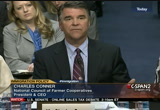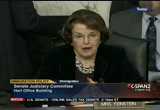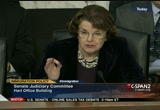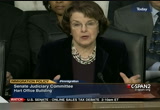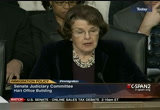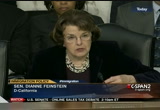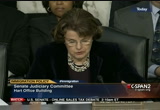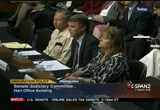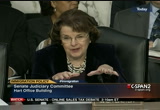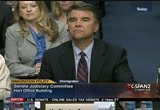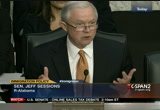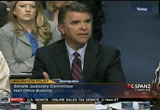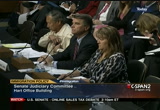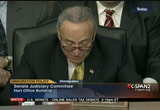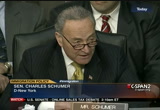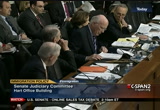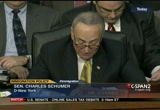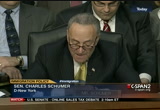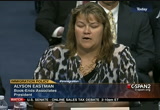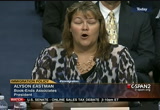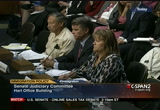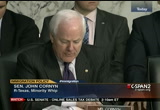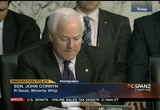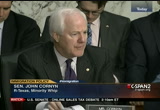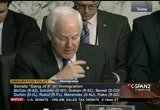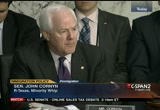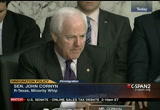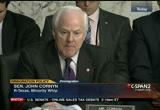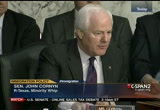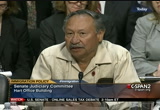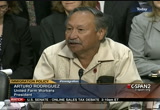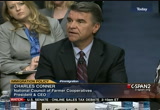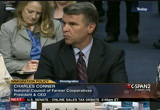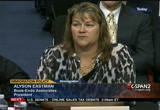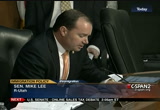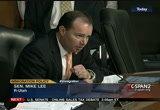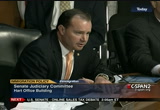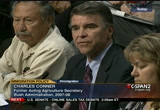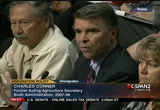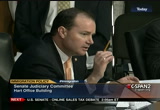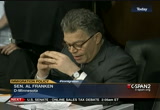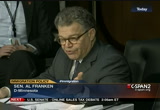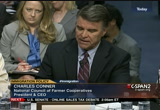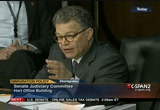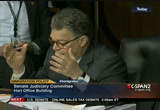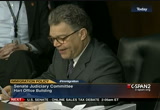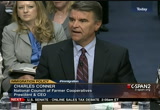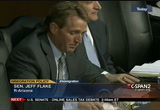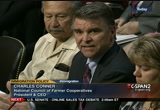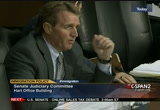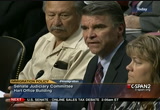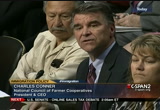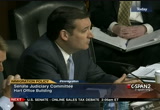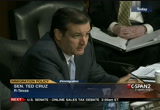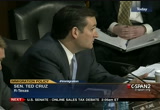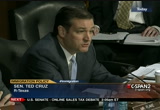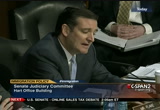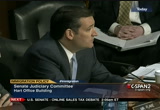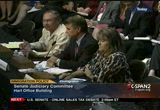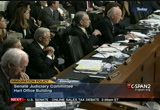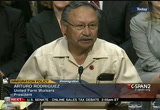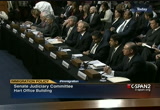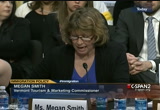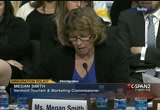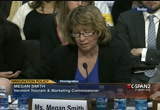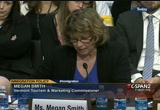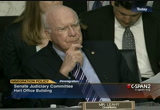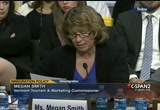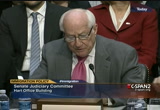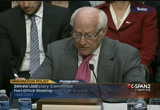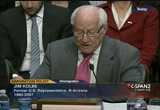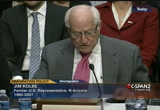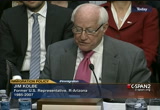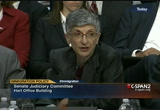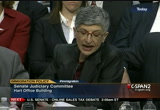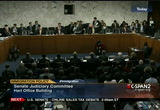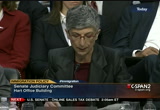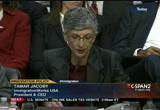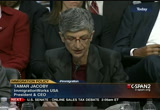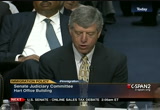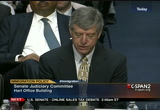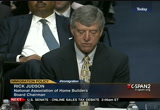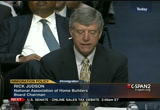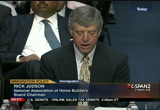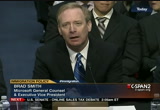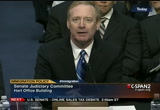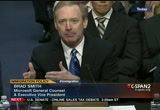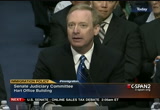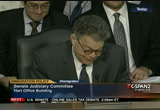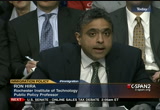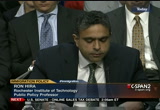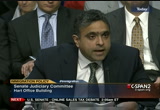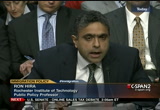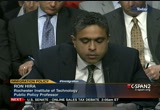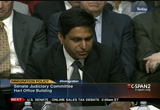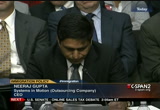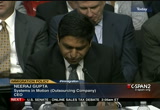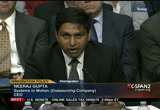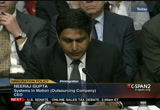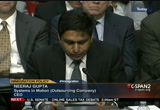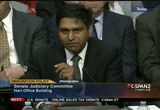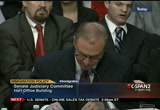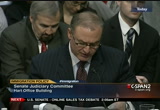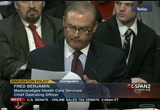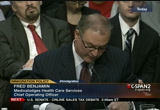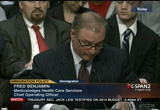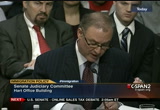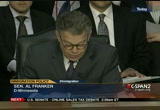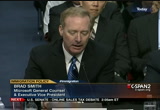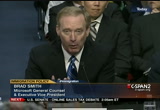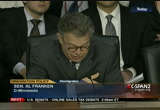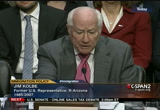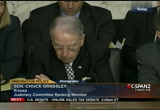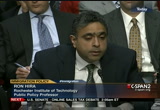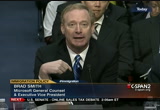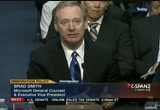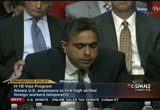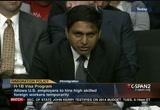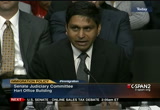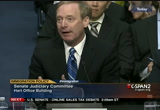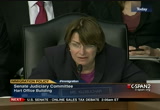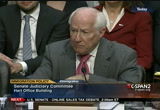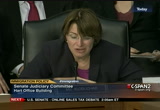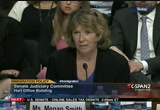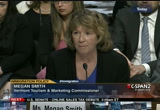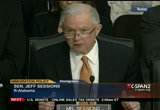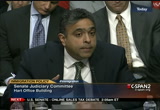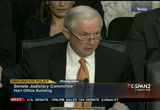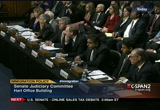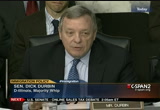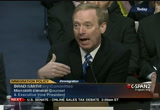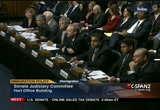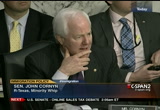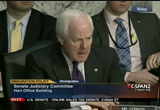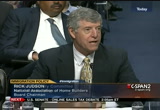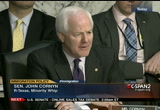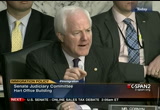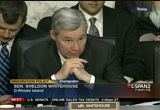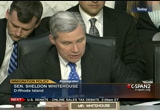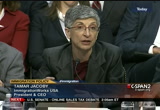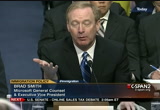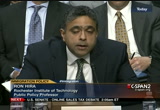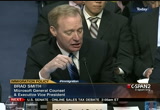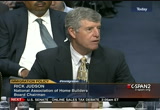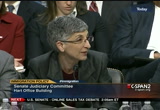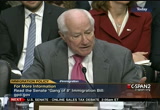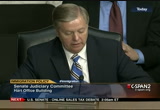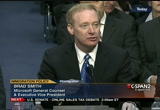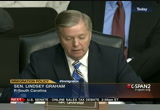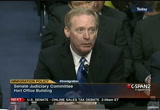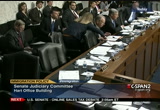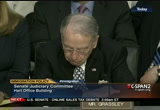tv Capital News Today CSPAN April 22, 2013 11:00pm-2:00am EDT
11:00 pm
before i ask specific questions. if there's anything in my question or my statements that are incorrect, i hope you will correct me. it's my understanding that the legalization program for agricultural workers mayors -- mirrors in part the main legalization program in the bill. it gives undocumented people up to two and a half years to come toward and provide. it prove they worked in agricultural for some time and give the same status to spouse and children. they pay a fine of $100. also like the main legalization program the department of homeland security required to provide any alien that apprehend after the date of enact with an opportunity file an application. those in removal proceedings get the same benefit during the time the application is pending. the undocumented person cannot be removed. they cannot even be detained if an application is denied because it doesn't have sufficient
11:01 pm
evidence, the undocumented worker gets another bite at the apple 378 going my first question, this is a way i read the bill. i want do you pell me whether or not i'm right or wrotening. it provides legal stay stay us ag work the secretary only has to submit a plan not implement it. the border doesn't have to be secured before millions get citizenship pop . would that been an accurate interpretation of the legislation before us? >> i would just say, senator grassley, that my understanding of the legislation is that the agricultural workers will be given opportunity to get legal status in this country immediately; however, at the end of five years if they meet the requirement and working in the
11:02 pm
agricultural industry they'll be able to gain permanent resident sei not citizenship. >> okay. >> and the reason behind that. the thinking tbhiend the discussions that . >> you don't have to justify that. >> okay. it was in roip to whether or not the sphtsship for this group of people could be possible without the border being secured. because of the time period. >> senator grassley, if i can supplement that quickly. let me tell you in order to be eligible for the blue card program, which eventually can be as arturo pointed out converted to a green card. you have to have a history of substantial agricultural work already in the country. >> sure. i got you.. now i want to give a quote from somebody commenting on the 1986 legislation as it deals with agricultural workers and following up on what senator leahy said the better for
11:03 pm
agricultural. i don't disagree with what you said about it, mr. connor. there are less sons to be learned from mistakes in 1986 the quote from agricultural of democratic. the exit of illegal immigrant granted special status and permanent resident from the early 1990 reflects a different phenomena following real wages and shrinking benefits encourage special agricultural workers to seek nonfarm jobs as economy improved in the 1990s. the special agricultural workers who left farm work were replaced by new arrived unauthorized migrant. by 1997 and 1998 it was estimated that the special agricultural workers were only about 16% of the crop workers. so, mr. connor, aren't we afraid
11:04 pm
or shouldn't we be afraid giving legal status to people here illegally will repeat the mistakes we made in 1986 putting the ag industry in the same position in the long run. in other words it comes about because of farmers come to us and they need workers. okay. we bring in the workers. then they migrate someplace else and people illegally came in after wards. how do we avoid the mistake we made in 1986? >> senate grassley, your question is a great question. it's -- it goes to the heart of fundamentally of the basis of our negotiation that on o- curing in senator feinstein's office. the blue card program for the current existing trained work force is an important component. equal we don't know with absolute certainty over the next decade or so what is going to be the status of the workers that will be receiving these blue
11:05 pm
cards. will they stay in agricultural in order get the green card. they have to stay in for a long time. the law requires that. beyond that we don't know for sure. we have had difficult negotiations over the second part that have the guest worker program and make sure that it's both at will and contract so it serves all of agricultural. because we know at some point we need additional workers beyond the highly trained skilled workers that are currently doing the work in the country that are likely to get a blue card. there will be additional workers needed down the road. we have to a viable worker program. the current program is not that program. if we have the blue card program in our existing h2a we would be back here in a few years, senator, telling you we have a big problem. >> my time is . >> that's what we've got avoid. we have to make sure we don't make the same mistake as 1986.
11:06 pm
>> thank you. we have two unique situations on the committee, as we mentioned with senator cornyn who had to be absent and all of us understand why. there's no question he should have been in texas and was. the other senator feinstein who is handled the ag negotiations. both will be given some extra time with other senators and i yield senator feinstein. >> thank you very much, senator leahy. i very much appreciate this opportunity. thank you very much. i want to thank witnesses here today. chuck, i hope you will thank tom for the negotiation of the specific wage numbers arturo, it's hard to call somebody by the last name when you sat for
11:07 pm
so many hours together. i want you to know that i don't know a labor leader in this country who cares more about his people who is more dedicated, more reasonable, and i want you to know it's been a real pleasure to work with you. chuck, i can tell you the same thing. the sessions were long. they were six or seven hours at the time. you all negotiated over weekends. we went back and forth through the course of this. it was easy to come out with what was necessary. one was there was a deep belief that a lot of blf studies on wage rates were skewed. therefore, we needed a new process. the farmers wanted spes thinksty of wage. we are slay for a farmworkers. we have a way of increasing it. we have a way of putting this under the department of alture.
11:08 pm
the secretary of agricultural will make the fsa, the farm service agencies, which exist in each state available. which should help farmers. the thing about the farmworkers was to find a way to put to recognize the skills and exist in farm work. and to try through a program to see what evolves out of this is a professional class of worker who can be proud. the blue card, we expect, and this is very rough would apply to 700,000 to 1.1 million workers. it exists for five years. you have to worked ag for a specific number prior to getting a blue card. you would be vetted and have to pay taxes, a fine, et. cetera. no major criminal activity. you get your blue card. then so you to work another five
11:09 pm
years dependent upon the number of dais a year. then you get a green card. the h2a program which exists only 74,000 workers this past year will cease to exist within a two-year period. it would be replaced by two visa programs. chuck spelled them out. a contract program, which replaces h2a. and an at-will portable visa program. they are both three years. there's a cap on both of 112,000 a year for the first five years. the total 300,000 plus and the secretary of agricultural in the future sets the cap. the wage rate, which is the adverse wage rate is phased out and replaced by this new
11:10 pm
methodology within soon -- i think it's a year after the effective date of passage of this bill. it's not been easy to put together. i appreciate senator grassley's comments. but i want him and others to know that we tried to figure what you were aiming at and compensate in terms of making the kinds of changes that would have a stable work force throughout for farmers. any staff is prepared, comments from each state that have come in with respect to the need. we have 100 copies and we make it available to anyone that would to provide additional information. i think every state is in here. it is as close to coming to a national crisis with respect to retaining this country's agricultural as anything. farms cannot farm because they do not have a consistent supply
11:11 pm
of workers. they cannot get the contractors, they don't know what to pay them, i mean, i sat next to a woman who operated turkey farm in california between the wage rates and the high price of corn because of ethanol had to shut down her business. that should not be the case in the united states. we think we have a solution to that. now let me go to the question. and whoever would like to answer this. this bill would require all employers to ensure illegal work force at some point by using e verity. it very controversial when it comes to agricultural. employers with more than 5,000 employees would be required to use e verify no more than two years after regulations are published. smaller employers would three
11:12 pm
years and agricultural employers have to comply within four years. dhs secretary, janet napolitano, shariad with this committee in february that the united states citizenship and immigration services recognizes the need and the unique nature of ag and the developed the pilot program to test the use of e verify in agricultural settings. i'm waiting to receive an update from dhs on the status of this pilot, but chuck connor, let me ask you this question. is dhs working with your organization and other ag industry groups to test the e. verify program. >> i'm not awafer anything at this point, senator fine stain. we can update based upon the surveying of order. we appreciate the fact that in
11:13 pm
the legislation there's some recognition of the small business aspect in american a churl and the fact that producers are moved, if you will, somewhat to the back of the line in terms of that being, you know, fullly enforceable under the e-verify system. we have new programs up and running. we recognize there will be glitches. our goal is to have a program for every farmers no matter how small that they have access to the workers they need without incurring enormous expense. we know they can't do it. >> let me ask both everybody here and arturo and -- chuck, i don't know you as well i know the other two. to please weigh in with dhs. this is controversial in agricultural. i know, there are bumps in the road we have to work out.
11:14 pm
we should get done as soon as we possibly can. 05 i'll say to the raping member, senator, i really believe with hour after hour and week after week that we have done the best we could to put together a bill that satisfy your concerns and also enables farmers in america to get a consistent supply of ag workers. so i hope that this will be 0 possible to pass even unamended perhaps there are a few things. it's been an negotiated agreement over a substantial period of time. and i know mr. connor you represent the american farmworker here as well as members of sheep and dairy and the others as alyson.
11:15 pm
arturo, there was a farmworkers union in this and you were outnumbered by farmers. you held your own. and i think you got good protections for your workers and i think you're really perform in the best interest of not only the union movement but the work force of the country. i want to compliment both of you strongly. thank you. i would like to recognize senator session and the chair is back. >> thank you. >> thank you. >> well, if seems to me as we deal with it. i believe the interest that needs to be protected in the national interest of the united states. that include existing workers today workers who have wages pulled down without doubt. large flow of labor in to the
11:16 pm
country. and this bill would continue that in a way that very disturbing to me. for example for the last ten fifteen maybe more wages have not kept up with the inflation in america. federal reserve in atlanta said as a result of the growth and the share of undocumented workers annual earnings of the average documented workers in georgia in 2007 declined 2.9%. i would say it's interesting we are union members, we have business people. they immediate and -- meet and reach an agreement. it's somehow presumed to be the interest of the united states. i would reject that. fundamentally we need to ask what is in the national interest. i'm dubious about the idea of
11:17 pm
jobs there are americans won't do. i work construction in alabama, hauling lumber and stuff. i know, americans do it every single day. tough work. it's done every day. where i was raised, when i was dealt with when i was talked about how we should think about that. we were told to respect people who did hard work. and not say if a job an american won't do. any honorable labor is good. the last jobs are 486,000 people dropped out of the work force we determined about fifth of that only is retirement only 88,000 job were created. i worry about the kind of things. ic we need to ask that. it seems to me that you -- the ag industry is saying we're entitled a certain number of workers. we demand the workers.
11:18 pm
and, mr. rodriguez, it can be have a long-term impact of reducing the salvation army of people who entered lawfully. people who get legalized today, immigrant workers. their wage is at risk too as the years go by. i would say that the immigration policy of the united states should be established based on the national interest. we are examining the legislation and find a lot of surprising facts. i'm not sure the bill sponsor fully understand it or not. i think it be approved to the legislation. we're going have to look at a number of those things. with regard to the ag workers program, mr. rodriguez, do you know how many people would be legalized if under this program? immediately?
11:19 pm
>> the potential as senator feinstein mentioned earlier, senator session, somewhere in the -- interest estimate right now. and the number we know that are here in the country. >> could some of those obtain legal permanent resident status in the little as three years? >> no , sir, they could qualify to be able to do that, but they -- no one will be allowed to gain from an illegal resident sei until after five years in the program. >> the status after five. other people in the country would wait ten years. we've been hear are ten years. agricultural workers able to get lpr status in five. is that correct. >> that's correct sir. and entitling them to certain benefits. >> it actually gives them an opportunity to be able to stay here to work in agricultural, to be able to ensure that they don't have to in my particular
11:20 pm
way veer anything from immigration services or anything of that nature. so they'll be able to stablize their family as well as stablize the agricultural industry. in the future, on the agricultural act immigrants come replace people presumably to move to other jobs thunder provision of the act. they will come for what period of time? how long will they get to stay in the country initially? the workers currently here right now? in the future. terrorist a provision here. he wants to make b sure he has what he needs. at the level he wowght like. >> mr. rodriguez, answer the question. >> i'm letting him answer. >> if there's a new visa program established it would allow folks to apply for and get three years
11:21 pm
visa as opposed to the way it currently is right now. that's the deal with issues like he was talked about earlier we have dairy work ands dairy industries included year-around problem . >> they would come in three years. would they be able to bring their families? >> no. they would not. >> and after three years, do they have to go home or stay? >> they have to go home far period of time. >> how long? >>. >> if i could, senator sessions, the for at-will and contract guest workers. they are eligible far three-year work visa. they are available for one renewal of the rei is a. that would combine a total of six years. during that six-year period they have to spend at the minimum three months, if you will, back, you know, in their home area. >> over three years how many months at home. >> three months.
11:22 pm
>> well. a person stay for six years, they get deeply attached to country in period of time. are you going ask them to go home then? well, to follow to that. obviously they have to have -- -- . >> you asked them to go home at the end of six years. >> they'll no longer be eligible because they can only get two of those three-year visa during the period. >> my time is up. i think that's where we are. i don't think they'll be hunting down the people and seeking to deport them. >> try to provide time for everybody. senator schumer? >> thank you, mr. chairman. and again i want to thank you for your continued leadership, support on imdwraition, can't thank you enough for freeing to consider the bill.
11:23 pm
jury room as initial matter, i would like to oint out that the immigration bill receive wide spread support and praise among law enforcement, business group, labor union, religious leader, conservative thought leader and immigration group. it's no accident that all of these folks were standing with us last week as we introduced the bill. this is not just a few narrow special interests. these are some of the leading groups that represent tens of millions of people in america. on the other hand, the only witness willing to testify against the bill today are three individuals from the so-called center for immigration study, an organize who stated goal is to reduce immigration to the united states and to invent concept of self-deportation. the author of the sb 1070, the controversial arizona law that was so far to the extreme it was stricken down as uninstitutional by the supreme court and head of the i.c.e. union been an
11:24 pm
outspoken -- american people are overwhelmingly in favor of immigration reform. that's what every poll says. -- [inaudible conversations] they will not be satisfied with calls for delay in impediment toward the bill. i would say to my colleagues, i understand their views are heart felt. start markup in may and vote on it. particularly those points to what happened the terrible tragedy in boss ton as -- i would say excuse, not doing a
11:25 pm
bill. >> i never said that! >> i never said that! i didn't say -- [banging] >> mr. chairman, i don't preach. >> let me finish, we are going to have probably the most open process on this that will be debate in the committee. we will have time for it. even senator gratszly snows i offered more time on this. we'll have the debate. i expect we're going to have a lot of debate. >> can i thank you. i wasn't intending -- those remarks were not aimed at anyone open the committee. there were people out there in the newspaper who said it. what i'm saying is there are things that come up as a result of what happened in boston, that
11:26 pm
need -- require improvement let's add them to the bill. certainly our bill tightens up things in a way that would make a boston less likely the change in the exit-entry system of visa, the requiring the 11 million people here to register, and all of that may get a tighter bill. maybe it should be made tighter still. we are open to that. that's all i'm saying. i've heard lots of call from people out in the country saying delay it. what our bill does very simply is add billions of additional dollars toward border security and fencing. tracking people immigrants that overstay their visa so they can be apprehended. individuals currently here would finally have to register with the government, give us photograph and fingerprint. all of it will make america a safer place. that's what i'm saying here. the status quo has none of these things.
11:27 pm
and therefore, no responsible person should be aiming to keep this status quo in order. let's move forward. let's have this debate. it's an open debate. let's discuss all amendments from all points of view. but let's not keep our present system, which everyone admits is broken. on agricultural, i want to thank senator feinstein for her great work, and senator hatch, and the members of her group. they have done an amazing job. i thank the three of you. you're a good example behalf we need america. people coming together, none of you got everything you wanted. you knew you each did a lot better than the present status quo. that happened in agricultural, i hope it will happen in the bill. my one question for alyson is quick. my time about to run out. vermont's agricultural market is similar to new york's. we have the same problems. we have a fellow in ontario county, one of the largest
11:28 pm
cabbage growers in the country that didn't plant this spring because he can't get labor to pick it up. huge number -- huge amount of cabbage, a huge number of jobs, a huge amount of produce that the american people are deprover -- deprived it. this will rectify the situation. can you mention how the bill keeps northeast growers competitors with the rest of the cup why it's good for the northeast and new york. >> much time -- i would like to narrow it down to the fact that the bill actually allow employers at an affordable rate to employ legal workers. the way the program is right now with the paperwork, the time lines it's difficult to comply with in and wage rates are exponential.
11:29 pm
it's $1 per bushel. in new york it's.62 cents. there's no consistency. they are done by the prevailing wage surveyor. there's nothing overseen on that. the housing, the transportation, it's very expensive. and yet it provides legal workers. it is difficult to get them here. so i think, you know, with united states department of ag facilitating the process it's going to be transparent. they understand thing a ag, the need behind it and keep in mind, i would like to let mr. sessions snow that we have employers open up and they have to through the h2a program.
11:30 pm
they hired eight pickers, u.s. everybody that showed up by week two there was one left. and the one picker asked if he could work in the packing house. it needs 55 seasonal workers to bring the crop. when i say americans won't do the job. it's true. they're not doing the job. >> well, -- and -- . >> there are factors that go it n to that. i know, the or chad. she stated accurately. senator cornen, again, i would seasonal . >> senator cornyn, again, i
11:31 pm
11:32 pm
worksite enforcement and overall permanent immigration both in terms of family and informant taste immigration. i fully expect there will be a healthy and i hope respectful debate about how we should address the 11 to 12 million people here in the united states who came into the country illegally or overstayed their visa in violation of the law which comprises of 40% of illegal immigrants. it impacts our national security, public safety and the
11:33 pm
health of our national and local economies. while engaging in that conversation we must not give short shrift to the scores of other critical immigration reforms contained in the bill including the areas i just mentioned. those who have read the bill know that the legalization program for 11 to 12 million people. what is in the other pages? that's important because it turns out quite a lot. much of it is at at least as important to our national interest as any solution for the 11 to 12 million here. here. mr. chairman would have this bill less than a week and of course as we all know we are still analyzing the scores of major reforms it contains what i want to say this to my friends who are part of the gang of eight. this legislation make the number positive improvements to our immigration system. there are things to commend both
11:34 pm
in terms of major upgrades to informant-based legal immigration and worksite enforcement. there are reforms in this bill but have the potential to boost innovation and job growth within the united states and there are reforms that will oldster for an tourism and incentivize foreign investors amount per nurse to invest in u.s. companies and workers. i appreciate the attention given to the bill expending resources for improving the assimilation and integration of immigrantimmigrant s especially in terms of promoting english language and citizen education. while well intentioned i request the security elements fall short of the sponsors -- that bill could do more harm than good. the bill sets will superficially appear to be a worthy target of
11:35 pm
the the 90% of pension raid along the southwestern border in. based on our preliminary review this 90% goal only applies to three of the nine southern border sectors and only two out of the five sectors in texas. so aside greeted the border security provisions in this bill will necessarily mean the border patrol will shift resources away and in a preannounced fashion from the most of the border sectors to reach the goals of only a few. we can only imagine what the transnational criminal organizations that move drugs, people, contraband across our border will do in response. order security matters in texas and along the southwest border's and the bill does not adequately provide for and i hope my colleagues will work with me to help get it right. i think we can do it. as i've said the bill is comprehensive but it is not exhaustive. in other words some important reforms were admitted that i
11:36 pm
think need to be included. for example the bill fails to address the needs for improvements in our land-based ports of entry especially along the southwestern border. the vitality of these land ports of entry are critical both in terms of security but also for the economic prosperity of legitimate trade and travel brought to our border communities and 6 million jobs in the united states. we must use this opportunity to provide meaningful infrastructure investment to the ports of entry in order to reduce wait times for legitimate trade and travel. i am also concerned the bill does not do enough
11:38 pm
department of homeland security the discretion to waive the bar for these pathways to citizenship so i look forward to working with my colleagues on both sides of the aisle to fix that. i also worry if the bill's implementation will frustrated by thousands of lawsuits unless we tighten up the administrative and judicial review portion of the bill. finally the bill falls short of allowing employers particularly make construction strewn with access to the labor force they need to run and grow their businesses. mr. chairman i look forward to a spirited and respectful discussion of these issues the challenge before us is to make sure we get all that right. and i leave the remaining minutes that i have.
11:39 pm
>> senator klobuchar. >> klobuchar. >> thank you mr. chairman and thank you to the witnesses. as a state with a lot of agricultural workers and oppressed by the work you have done in the fact that armor siemens and farm bureau and your amazing work that all of these organizations are supporting in this bill is truly a tribute to your ability to compromise and see the bigger picture. i thought i would start with you mr. rodriguez. i've been so impressed by your work and you can imagine that some people still get concerned about what this could mean for american jobs with the guest worker agreement and that someone with immense credibility in the labor movement and others fighting hard to protect american workers can you summarize what you think this bill is a good thing for american ag workers? >> first of all, senator klobuchar the workers that are currently here now and the united states are going to have an ample opportunity to gain legal status first of all through the blue card program
11:40 pm
and secondly for legal residency. secondly there is clear language in the bill that calls for no discrimination against u.s. workers and we have lots of discussions with the employers with regards to that. they are also in agreement that they want to keep experienced farmworkers that have the ability and have the skills to grow their crops as ms. eastman mentioned earlier. it doesn't help the workforce to have rotating members or workers that we know want to do everything they possibly can to maintain that stability in the ag industry as much as we can. and so legalization is our number one issue to try to deal with so we can keep the workers that are here right now come keep those professional workers the skilled workers in the ag cultural industry and secondly to pay provisions in there that there would not be discrimination against u.s. workers as the new visa programs are implemented. >> thank you very much. i've been hearing from ag reducers for years about the
11:41 pm
problem of the h2 a program and i'm happy we are going to find a way in the program to make this work better. sometimes immigration programs and the individual rules can get confusing. can one of you explained what you see what the problem of the h-2a program and whether you think it bill will address these problems? >> i know your time is short senator. their wage rates that are part of the h-2a program for your constituency obviously the fact that it's strictly an attwell program that provides no value for year-round workers. secondly i would say the administrative bureaucracy of the program. small producers do not have the ability to hire consultants to navigate their way through in an h2 way application process. >> that's for sure.
11:42 pm
can someone explain why it's important to have the ag department and a guestworker program instead of the labor department? >> i will try that as well. let me just say i think a couple of different ways to answer that. certainly there's a structure rd in place for not only the state level usda offices but we all know there is a virtual usda presence in every county in america and certainly every major agricultural county. these are all producers albert that deal with quite often and they are quite familiar. there are people in those offices were not only helping the producers but helping them navigate through this process. we believe they will be quick to use the local system as well established out there in america today. >> thank you. ms. eastman i thought one of the most important parts of her testimony was when he talked
11:43 pm
about the indirect benefits really of the guest workers and in fact we have some kind of status. sometimes they use him here and sometimes they ship them back whether it's motorcycles washing machines you name it. you also mentioned a positive impact for rural areas. could you talk more about these indirect impacts you have seen in your community? >> yes. thank you senator. at the end of harvest we have a -- that is a set route and it is all friend by travel service. it's great because when i get the listing of where it's going to go the workers know before i do. it's like an underground tunnel. they can't wait. they go to costco and walmart and buy motorcycles weedwhacker's washing machines and all of this is shipped back because they tell us is cheaper for them to bite here and ship it home. i have paid $200 for a canoe and
11:44 pm
a cost $200 to get it home so the point being made is a lot of the money they make here in the united states is spent locally here as well. >> thank you very much all three of you. >> thank you very much. i am told senator lee is next. go ahead. >> thank you mr. chairman and thank you to each of our witnesses for joining us today. have a brief statement and a couple of questions. i recognize the labor problems facing our ag cultural industry are different from those of other industries in her crib when important to our nation's economy. the nature of agricultural work in the course even the hardest working of americans the long sporadic hours and the secluded worksites nominal wages that result from low margins for food products in the back breaking physical labor itself often should be to a relative lack of interest and participation in
11:45 pm
these jobs by american foreign workers. creating a sustainable guestworker visa is essential for keeping our nation's farms and ranches fully staffed. that is why i introduced a bill that would expand access to the h-2a program for an additional category of worker and employers. addressing problems for agricultural workers and employers must be part of any piece of reform so i'm glad that we are having this discussion this morning. i was wondering if i could start with ms. eastman if you could tell us a little bit wide and stored a free state for us why you think the h2 way program is insufficient particularly as it relates to some of these industries like dairy farming and sheepherding? >> i can't speak to sheepherding because i have not had direct
11:46 pm
access. as far as the dairy farming goes, it's impossible. we have two dairy farms that do have h2-a workers but there are there to repair fences and work in quarries that will be used as pastures. so it's not related to milking cows which is simply an everyday function at these farms. so in part it's not available. >> explain to us why it isn't. >> because right now h-2a is a 10 month seasonal so if you are an employer and that is not just the employer. the h. 28 employee can stay here longer than that. one individual employer can only have h2-a workers on site for 10 months out of the year. >> which doesn't work for some of these areas. >> that's right and not based on a fiscal year like you take apples and they come in august and they will pick them and they have to be done by the end of may. so it's not limited to a fiscal
11:47 pm
year. >> is bill and your opinion addresses that problem? and how it faces the problems? >> it faces the problem because i think actually mr. connor can speak to that matter with the different types of visas. >> mr. conner? >> dwelleth fixes the problem fundamentally by creating two different groups of guestworker programs. one would be the seasonal attwell that would be the most similar to the h-2a program but the other is a contract program again where you would have the ability to bring an year-round workers on a contract as you noted to perform those milking functions and the horses on the farms and those kinds of things where u.s. was noted earlier house don't stop producing milk. they produced 24/7 everyday the year. >> that is the nice thing about cows. they are considered in that regard and produce year-round.
11:48 pm
looking long-term do you think this solves it for the long-term? do you see this as a long-term fix for something we would have to tinker with every four years? >> there is no question that senator lee we picture this is a long-term fix. this was fundamental to our coalitions efforts. we are not looking to come back and do this in a few years because we know that is not going to happen. this has been a problem that is developing really since the mid-1980s and we believe that the combination of the blue card program for our trained existing workforce and guestworker program both that well in contract administered by usda provides that long-term access to the workforce, legal workforce we are going to need to continue to produce the card crops and food for america. >> can you tell me how the caps work, the caps on the number that will be available?
11:49 pm
>> yes. there is a cap on the visa workers. in year one the cap would be set at 112,333. you can know by some of those numbers this was the product of a lot of negotiation and there is compromise on both sides in terms of the setting of those caps. another 112,000 would either in your two and your three so by year three the cap would be 337,000 workers. in no event could the capital be between years three and five and from years five onward there would be no cap. the secretary of agriculture would be empowered to set the cap based upon need for the number of guest workers we would have in the country. >> okay and that is why you see this as a long-term fix because you are then allowing us to respond to changing economic circumstances through the department of agriculture? >> absolutely.
11:50 pm
>> i see my time has expired. thank you very much. >> thank you very much senator lee. senator franken. >> thank you mr. chairman. i just want to take a moment to respond to those who say immigration is such a complex problem that we can't address it with a comprehensive approach. i believe the complexity of this problem and the connectedness of the issues involved in immigration speak to the need for a comprehensive reform. take for example border security. border security is critical and i'm not very happy to see the strong provisions in this bill are in it. but if all you did was secure the border with walls if there is still a market for undocumented labor you would create this huge market with
11:51 pm
11-foot ladders. and so you need to verify, you need to be able to verify workers. mr. connor and mr. rodriguez first of all i want to congratulate you in working with each other. i think it's a great thing. mr. connor one of the important aspects of the bill is the delayed phase-in of the employment verification requirements, add culture employers aren't required to participate in the e-verify program. four years after regulations are issued which will be about five years after the passage of the bill this will prove important for farmers in minnesota. lots of our farmers farm small
11:52 pm
operations. it's going to take time for these programs to get up and running. can you mr. conner identified why the delay of implementation of e-verify is prudent for agriculture? >> is a great question senator franklin -- franken. we really are creating in many ways in some ways almost 30 grams. you have the blue card program and then you have the year-round contract part of the guestworker program and then the attwell part of the guestworker program. we know that this is going to be administratively difficult. we know there will be bones and bruises along the way on the implementation. this ensures again for agricultural production which is so important in terms of timeliness that there is going to be a maximum amount of time
11:53 pm
here before the e-verify system is kicking in and fully operational so that we can make sure that these three new apparatuses are working and the caps are being set in sent in an adequate amount to provide the workers that we need. it just gives time because remember senator franken you know these are very small businesses. our american farms and ranches almost by any standard and more than anything else we want to make sure the small producers know the programs, no the legal workforce here before we get to enforcing this thing out on every single farm or ranch in america today. i think that's only fair. especially for these farm operations. we need to make sure that this e-verify program has an accuracy, a higher accuracy rate than it has now. i am worried that it will introduce millions of immigrants
11:54 pm
into the system. the error rates tend to get higher when you do that and when you run a dairy operation or other small businesses for that matter, you don't have a huge h.r. department like you might add other businesses. so i think this is just very important that we understand how this all fits together and that we have our eyes wide open. but to me it is absolutely essential that we do it at one time because everything is so interrelated. i am very pleased with this is going to do again for our dairy industry. half of all dairy cows in
11:55 pm
america are milked by immigrant labor. and i have called for this for years and i'm glad the senator feinstein and senator leahy have made efforts to do that. in your mind mr. conner, what in addition to dairy and by the way senator the chairman says something about you say to cows we are only going to milk you seasonally, they don't know what you are saying. >> they do in vermont. maybe not in minnesota. >> well, okay. i know the chairman is a deadheads so no comment on where he got that. sorry, senator.
11:56 pm
>> has the senator finished his question? >> i have no idea where i was. aside from dairy what are the most helpful aspects? >> again, senator we have a problem in american agriculture today reflected in the fact that so much of our workforce is currently undocumented. for anything else that we have we recognized the problem exists today. the status quo is intolerable. so across all of the agricultural sector the notion that you are going to give us the ability to actually have a legalized workforce that we know can verify that. farmers and ranchers are the most law-abiding people on the planet. they want to have access to those workers. more than anything else fundamentally this bill gives
11:57 pm
them that ability. they are legal and that is huge because the status quo again is what are the alternatives? i challenge those to suggest that. the current system is broken. we have got to change it. >> thank you mr. chairman. >> i think the chairman and thank the witnesses. i just want to thank all of you and senator feinstein so for working so hard to get an agreement here. we were kept informed those of us working on the broader agreement of the progress that was made in the hurdles we had to overcome and is not an easy task as we all know. congratulations for working together on this and getting this done. i mentioned when we launched the bill last week i grew up on a farm working alongside migrant labor and i know the motivations
11:58 pm
that they have and i know how difficult it is and i know that they were here to make a better life for themselves and for their families and for the life of me i've never been able to place all those who have come here across the border undocumented and some criminal class. it just never rung true to me that way. so i want a solution here. i made it off the farm with almost all of my digits. i just lost the end of one in and out fell for field that i can tell you i'm here largely in politics because i got tired of nothing house. it's a tough job. you can't tell them no we are not going to milk you today. it doesn't work. i have tried and it just doesn't work. but i appreciate what you have done here and mr. connor i appreciate working with you and the fda on the issues and appreciate the work you have done. let me just say your experience.
11:59 pm
i know you have been working on a solution for ag for years now. why is that so difficult and why is it important to have this as part of the broader bill and why isn't it easier is part of the conference of package or at least possible? >> i know you have you've been working on this. why hasn't it been hemp possible to achieve on its own? >> senator your absolute correct that agriculture, this is not a realization that is come, about in just the last few months. we have known we have had a problem for a very long time and we have worked with senator feinstein on solving just agricultural problems for a very long time as well. i would just say that history suggests that didn't work. the agricultural problem in and of itself probably was not going to produce successful
12:00 am
legislation. so being a part of the comprehensive effort and our negotiations have been very limited in just the agricultural field but we appreciate the fact that it's part of the broader package. there seems to be some momentum to get something done this year because we have been talking and proposing solutions and in some cases even producing legislation for a very very long time because this has been a problem for a long time. we believe 2013 reflects what i've described to many as the best to stop talking about it and finally fix fix it. >> just to go on with that, if we fail to reach an agreement here and there is no agreement with the subset of agriculture what with the consequence be? how much of our industry do we stand to lose if we can't reach an agreement here?
12:01 am
>> the consequences are substantial senator. some of those i put in my opening statement but again the status quo means that a large percentage of the american workforce and a large percentage of the workforce are going to continue to be undocumented workers who are not here legally. it's untenable to the american producer out there that somehow we can't get him or her a legal workforce. so that is first. secondly we do have labor shortages in this country and it is resulting in crops going unharvested, resulting in agricultural production and i cited the case of a california study of tens of thousands moving to another country. >> just and the remaining seconds i have some will argue if we don't have the foreign labor force and somebody needs more jobs for more americans,
12:02 am
how did the lack of a program like this affects u.s. jobs or american worker jobs? >> perhaps arturo has a comment and i know time is running out but i will state this issue has been studied and looked at exhaustively. senator feinstein has been personally involved in a number of efforts out there to really demonstrate, are we replacing u.s. jobs here? do we really do do this but we are just not paying enough for something is wrong so therefore we are turning away these workers. time and time again study after study several cited in my written testimony that is not the case. they will not do this work and without this workforce in food production will -- in crops will be left to unharvested in the u.s., period. >> thank you.
12:03 am
>> thank you mr. chairman. i will note at the outset that i regret i'm not able to be here at the hearing on friday. i join my colleague senator cornyn down in west texas visiting with the victims of that horrific accident and i want to thank my colleagues and the millions of americans who lifted up the citizens of west who have been suffering through that tragedy both west texas and obviously boston who both in the past week have had horrific tragedies and certainly we are lifting up those who have lost their lives, their family and loved ones and the many who are suffering. i'm grateful for the great many prayers for the citizens of west who are suffering. i want to thank each of the three of you for being here
12:04 am
today and your testimony and her hard work and commitment to immigration reform and indeed i would like to thank all of the members of the so-called gang of eight who i think have worked very very hard on this difficult issue to try to reach a solution to a very difficult problem. and so i commend the efforts of four democrats and for four republicans who worked very hard on this. i think there is enormous agreement in this country that our immigration system right now is broken. i think that is bipartisan agreement and i think across the country there are huge challenges. i think those challenges are particularly huge in the agricultural area. i will note for me this is an issue that is not simply abstract.
12:05 am
i am the son of an immigrant who came from cuba with nothing and the grandson of agricultural work. my grandfather worked in sugarcane on a plantation under very difficult circumstances. i would like to commend the seniors -- for the subsidence report that she has put together. i have made a point on texas and i will note what is contained there very much comports with what i have heard farmers and ranchers throughout the state of texas agriculture is critical to my state as it is to her state and i suspect every member of this committee. i think all of us would like to see a bill that fixes the broken
12:06 am
immigration system. i would suggest in my view the strategy that will be effected to pass the bill is to focus where there is wide bipartisan agreement. that is how we will get that bill passed. and in my judgment there are two broad areas of bipartisan agreement right now. number one, think there is bipartisan agreement that we have got to get serious about securing the border. and we need to increase manpower and we need to increase tech knowledge he and we need to fix the problem. in a post-9/11 post-9/11 world it doesn't make sense right now that we don't know the criminal history and we don't know the background of those coming in and i think there is wide agreement we should fix that including the problem of the overstays which is significant and illegal immigration. i think there is likewise wide bipartisan agreement that we need to improve legal --
12:07 am
that we need to shame line it and reduce the bureaucracy and reduce the red tape and reduce the waiting period. one of the things all the three of the witnesses have talked about today are difficulties in the h2-a system and having that system work. one of the reasons we see it illegal immigration at the levels we do is because our legal immigration is not working. all of the champions of legal immigrants making the system work and not just welcoming but celebrating legal immigrants. i think if we are going to see immigration reform bill passed that should be the focus of the bill. i think if instead the bill includes elements that are deeply divisive and i would note that i don't think there's any
12:08 am
issue in the entire debate that is bored divisive than a path to citizenship for those who are here illegally. in my view any bill that insists upon that jeopardizes the likelihood of passing immigration reform. so it is my hope that in passing a bipartisan bill, dressing areas of common agreement, securing the border, improving legal immigration, improving agricultural workers to ensure that we have workers who are here out of the shadows and able to work legally, i hope that reform legislation will not be held hostage to an issue that is deeply deeply divisive namely a pathway to citizenship. in my queue that is how we get something done. we focus on areas of agreement not on areas of disagreement and i'm hopeful that over the course of consideration we will see some consensus coming together to exact weight do that.
12:09 am
thank you. >> thank you senator cruz. senator graham. >> i will pick up where my friend left off about the census. i'm a big wrong but after having dealt with this in 2005 they think we are beginning to reach consensus as a nation. the first consensus reaches the current system is not working. if you're worried about amnesty that's exactly what we have. we have people running around the country with no way to find out where they are in the current -- the visas run out and it's too complicated so i think most americans think the status quo won't work and they want border security. there are very few people in this country who think order security is not a good thing. they didn't come across the
12:10 am
lord. all the hijackers of 9/11 -- and if austin tells us anything we need to be aware of who is living among these was the variegated or on or come in on at the same become a citizen. there's a consensus about order security and status quo should be replaced. i think there is an consensus about what senator crews that with this caveat. i don't want a foreign worker to come into the country and take a job as a willing american worker and the only time i wants to hire somebody mr. rodriguez is when an american worker will not advertise a competitive wage. so you get this system under control and you really don't know. why are there almost no native-born workers in agriculture?
12:11 am
because they were too harder we have moved on as people or that wages are too low and most of them are illegal immigrants. we won't know until we get the border out of chaos and the other thing people need to come to grips with them this is where senator crews and i disagree that 11 million are not going to go when most people are okay with the pathways to citizenship if you don't cut lines on those who have been patiently waiting and if it's a condition of staying here you do criminal background check and you have to pay a fine. you have to learn the language. and hold a job. we are talking about it 10 year plan before you can apply for a green card and the conditions on the pathway to citizenship for you have to learn our language and have to pay a fine for the crime you have committed. you have to go through criminal background check and you have to seek a job. i think most americans would say
12:12 am
that's a practical solution. most americans like me did not want to deal with this 20 years from now. my goal is to end this debate and get it right. when it comes to the agricultural community mr. conner do you believe that most people working in agriculture are noncitizens? or it illegal immigrants? >> senator graham i believe the statistics do verify the numbers are somewhere between 60 to 70%. >> why is that? >> are undocumented workers. >> why is that? mr. rodriguez do you agree with that? >> yes, sir. >> why is that? >> you pointed out some of the reasons serve. he said the current system that are in place or not effective. >> employers can't get enough --
12:13 am
because it's complicated by expenses. do you agree with that? do you also agree that it appears meatpacking old string agriculture some of the more labor-intensive jobs is hard to find labor in our country? do you agree with that? i'm not here representing the meet packing industry but the agricultural workers out there there's no there is no question i wholeheartedly agree with that statement that you cannot get americans to do this work. >> is the question. if you pay them $40 an hour you probably could that nobody would be left in american agriculture. they would go to mexico. we have got to find a way in my view to replace our agricultural workforce with 60 to 70% illegal and everybody should be legal. there is no benefit to our economy by having a bunch of
12:14 am
illegal workers in any part of the economy dominate that part of our economy. >> senator review and feinstein have good done a good job with replacing it illegal work horse with illegal workforce and one more minute. the pathway to citizenship have three triggers. they have to see border security strategy created by homeland security before the pathway to citizenship can be fully implemented and you have to have e-verify up and running and control thesis before people can transition from a temporary legal status to get a green card. i think those three triggers makes sense that this committee can make those triggers more effective and senator cornyn can help us on the exit visa system count me in and if we can find ways to secure the border better
12:15 am
senator crews count me in. at the end of the day i want to make sure that we do not have a third wave in getting the agricultural part right and 60 to 70% of the workers in agriculture that are illegal seems to be good place to start. you have done a good job and let's make it better for canned. >> thank you and as i said i want to thank this -- go ahead. >> i have been where the chairman has been as the chairman of the committee and we have to move on but i do want the record to show that we are hoping to have a second round so we will submit their questions. >> i appreciate that. i'm looking at the number of witnesses we have today. it will take some time and of course we will have another panel tomorrow with that of
12:16 am
homeland security. i want to thank mr. rodriguez, mr. conner and ms. eastman for being here. each one of you have been very helpful in putting this together. i want to thank senator feinstein and senator hatch and others who have worked so hard on the agricultural part of this so thank you all very very much. >> can we make any final points, sir? >> i think -- go ahead. >> will be very brief. again we want to thank the committee for all their hard work and we want to certainly thank once again senator feinstein for her diligence in all of this. one closing thought that i think what we have tried to do here in working together over the past few months and years is to really do something that would honor farmworkers in this country and the work that they
12:17 am
do and there has been a lot of discussion about that and secondly that we do have an industry, and agricultural industry that will maintain its viability. i think all of us in america want to see product -- products produce here that surfers and vegetables. >> having had the honor of serving as chair and ranking member of the senate agricultural committee alfond the most powerful nation of earth that we can supply your own food with agriculture and vibrant east to west north to south agricultural. thank you all very very much for being here. megan smith, jim kolbe and judson please come forward.
12:18 am
we are going to go straight through the noon hour because of the numbers we have. some senators have been thinking of going in for lunch and other meetings that are taking place but we will begin with megan smith who is commissioner of the vermont commission of tourism appointed by -- in 2011. before that she was in the vermont legislature and before she became commissioner she and her husband owned and operated the vermont in which is a very nice place. for over a dozen years. ms. smith, go ahead. >> chairman lacie ranking member
12:19 am
grassley members of the committee i'm pleased to be here today on behalf of the vermont department of tourism and marketing and the broader traveling community to highlight the importance of travel related provisions included in immigration reform. vermont is very dependent on tourism. our percentage of jobs in the industry is twice the natural -- national average of 38%. the majority of our businesses are small and family-owned and agri-tourism is growing in a very high rate. we are starting to see a steady increase of international visitors and it is a market we are focusing on much more with the support for brand usa. while we benefit for being a weekend destination for millions of travelers in order for small businesses to flourish we need to attract more international travelers who stay longer an average of 14 days and spend more money. our nation has not remain competitive in the global traveling marketplace. from 2001 through 2010 our market share of the world
12:20 am
traveler fell from 17 to 12%. this resulted in more than 78 million international travelers going somewhere else and the u.s. using losing 460,000 jobs in $606 billion in revenue over those years. in the importance of growing international visitation let me highlight these provisions in immigration bill that will address some of the most pressing barriers facing inbound business and leisure travel in the u.s.. we fully support all the provisions of the act included in the proposed legislation and particularly we strongly support the expansion of the visa waiver program which is critical to both our national security and our economic health. according to commerce status department the commerce data feed wp visitor spent nearly $677 billion in support and supported 525,000 american jobs
12:21 am
in 2011. keeping unnecessary restrictions will already enhance the strong diplomatidiplomati c and economic ties between the two countries. vermont has an important relationship with their canadian neighbor. this relationship is especially strong in the northern regions where thousands of kenny's hands-on second homes. as these homeowners reach retirement they are interested in spending more time in the u.s. so we strongly support increasing their time to remain in the u.s. to 240 days. vermont has also been a pioneer in the eb-5 program for the unparalleled efforts of resort making our state the first in the country to successfully utilize this program for development and expansion. it's a perfect example of this program's benefits for the economy and the local community where jobs are scarce and a part of vermont where conventional --
12:22 am
is not an option. we appreciate the inclusion of permanent authorization of this important program. we also very much appreciate inclusion of their form to the age to be visa program which is highly important to employers of regional tourism industries. most importantly the states with the lowest populations. ski resorts in the winter beach communities in the summer rely on these workers to not only proved to be excellent employees but bring a cultural experience to states that do not necessarily enjoy a great deal of diversity. when a trained employee can return for several years in a row is a great benefit to all. we thank you for including 4601 and 4602 in the bill. in order to enhance security and while adding -- in order to enhance security while also facilitating legitimate travel and trade we strongly support the admission of the 3500 border patrol
12:23 am
officers included in this legislation. in order to ensure the officers are allocated properly we urge the committee to work with the dbp to do so by the number of officers needed and it scared land and seaports of entry. lastly i would like to highlight one of our areas of concern. the proposals in section 6 of the immigration bill could -- by 75% or stifle the organization's global impact and heard states like vermont to reach new markets. the 2010 passage of the bipartisan travel promotion act was supported by the overwhelmingly majority of the u.s. senate including senators on this committee. i represent the small rural stayed under the brand usa marketing committee. this organization has allowed those of us that are not gateway states to finally have a voice in the international travel
12:24 am
market. since brand usa and vermont have partnered together and allow vermont to enter the markets of great britain and japan using boston new york and montréal is a gateway partnering with jetblue who has seen an increase in visitatiovisitatio n to vermont from jfk and i have been able to hire a pr firm in both of these markers to promote tourism. cutting brand usa funding by taking 75% of the eba fees for border security will have an immediate negative impact on travel across the u.s.. their excess funds that are not being used by brand usa. immigration bill should focus solely on using those funds for new border security initiatives. in conclusion, if the u.s. recaptures its historic share of worldwide overseas travel by 12,015 and maintains that share through 2020 it will add nearly 100 ilium dollars to the economy
12:25 am
over the next decade and create nearly 700,000 more u.s. jobs. it's a positive travel provisions in this bill will help us achieve this goal. i very much appreciate the opportunity to testify today. >> thank you very much. next is former congressman jim kolbe from the arizona's fifth district i believe. he served for 22 years. president obama recently appointed kolbe for trade policy and negotiations on trade matters and he and i worked together on a number of significant matters during his years in in the house and we are glad to have you back here. please go ahead. >> thank you senator leahy. senator leahy and members of the committee thank you for inviting me to testify before a exam behalf of the border secured economic modernization act of 2013. i have the privilege of serving
12:26 am
in the nicest congress from 1985 until 2007 representing arizona's fifth and eighth congressional district. immigration is an issue that has always been in the forefront of this district. i applaud the senators and the so-called gang of eight and my colleague senator flake from arizona who spent months preparing this legislation. the bill currently supports positive provisions that help uses businesses are immigrant population in our country as a whole. others on the panel have discussed various economic considerations but i want to talk about one particular provision completing family unification. i know as a partner of the panamanian immigrant of how especially difficult it can be to build a life under our current cumbersome system. all of those the bill you're considering is an icon starting point it is still incomplete. families like mine are left behind as part of this proposal. equally important u.s. citizens and our economy suffer because
12:27 am
of the admission of transgender families from the bill introduced last week here my partner in future husband was born in panama and came to the united states on a fulbright scholarship and studied special-education. he's a dedicated teacher for almost two decades. he was forced to return japan among when his work visa expired. our 12 month separation like that of any american from their spouse was painful. had to return to panama while he applied for another visa. eventually we accomplished it but it was a long process and expenses far beyond the reach of most families. a month from now hector and i will legally marry in its shift of columbia's fronted by family and friends. we are immensely fortunate that hector has secured an investment visa that has allowed him to stay with me that many couples are not supported. their abilities to secure solution allowing them to build a home family or business together is elusive and
12:28 am
difficult to realize. this committee has an opportunity to fix that problem. united american families act legislation sponsored by chairman leahy and senator collins would make a profound difference in the lives of many americans and their families. by mending our immigration law for and families as our nation treats of immigrant families it would ensure american citizens are not torn apart from their loved ones are forced into exile abroad. the conference of immigration reform bill under consideration by this committee includes important provisions to make u.s. citizenship more competitive. it does the same. which is why it's important -- fortune 500 companies like intel marriott texas instrument and u.s. airways failure to recognize it has a direct impact on american business. in a letter to the eight senators who offered economic
12:29 am
opportunity in the modernization act are most prominent companies wrote we have worked to help american employees whose families were split apart because they cannot sponsor permanent partners for immigration benefits. we lost that -- we have worn the cost of transferring and retraining talented employees so they may go abroad for their loved ones and we have missed opportunities to bring the best and the brightest the night states when their sexual orientation means they cannot bring their families with them. it isn't just major corporations of lucel. in columbia south carolina or restaurant owner with 25 employees made the difficult decision to close his business in order to move so he could be with his partner. in los angeles and young art or newer who employed 30 employee shutter stores after his partner's visa expired and they were forced into exile. these should give us cause on the reflect of the priced american business and american
12:30 am
families when we choose to leave some of our fellow citizens out of reform to our immigration law. it's time chairman leahy and members of this committee to fix this part of our immigration law. the opportunity is too rare. the positive impact too great to leave anyone behind. adding you offer to the bill would be a big step toward making this a truly comprehensive bill. thank you mr. chairman. ..
12:31 am
support for this legislation. the temporary worker, these have a thoughtful and innovative blueprint and we look forward to supporting passage. most importantly, increasing the size so that it works to prevent future illegal immigration. diverting unauthorized emirates and replacing it with illegal labor force. i will use my time today to address three issues. number one, the economic deficit of less skilled immigration. the u.s. work force is changing american family is having fewer children and birthrates are now well below levels. 10,000 baby boomers are retiring every day. and the lush and her workers coming behind them are much more educated than their parents. in 196064% of american workers were high-school dropouts. today the number is less than 10%. together these three factors have had a dramatic effect on
12:32 am
the pool of americans available to fill low-skill jobs. it is no accident that my members are constantly complaining about the difficulty finding workers. the pool have to draw on a shrinking. for those seeking higher, unskilled man of prime working age the supply of u.s. workers is literally half the size it was in 1970. if a thing, demand is growing. in $0.195,525 of every dollar spent on food was spent in a restaurant. today it is $0.50. one of the fastest growing occupations in america is some help aid. many less skilled immigrant workers and only then increasingly in years ahead. aside from taking jobs for americans, by and large this support and create jobs for u.s. workers. low-skilled immigrant workers allow restaurants to expand creating jobs for u.s. corn chefs, waiter star restaurant managers and others, farmers, janitors, architects, you name it come up and down stream and the economy. the urgent question is how to fill this need for less skilled and/or workers which brings me
12:33 am
to my second issue, design of the visa program. the gang of eight senators challenged the program. the existing program offered little to build on. intensely disliked by employers and labor advocates alike, but the senators have lesley succeeded, in my estimation. the visa program is a creative, well-crafted blueprint. among its most innovative features, in contrast to other temporary workers programs for all workers would not be tied to specific employers but can change jobs that will accepting work from any employer enrolled in the program approved to participate. this is a win-win for workers and employers and most particularly employers providing flexibility in the possibility of hiring and real time. the size of the program is designed to adjust automatically and in response to changing u.s. labor needs growing in good times and the economy needs more workers in shrinking in down years when americans are out of work. number three, employers who
12:34 am
participate are required to try to hire americans first and pay the same or more than they pay american markers. in contrast, existing temporary worker programs applying for her thesis lot is relatively simple, straightforward, and predictable . the mine, my numbers, much to admire. they remain concerned that the program may not be large enough to accommodate u.s. labor needs. as a result, it may not succeed in replacing the existing flow of illegal and rinse with illegal foreign labour force. without a work will temporary visa program the nation can have up no hope of ending illegal immigration. of course, enforcement can help, but ultimately the best antidote is a legal immigration system that works. meeting unmet u.s. labor needs with an adequate supply of illegal foreign workers. we learned this lesson the hard way in 1986. if we repeat that mistake again this year in ten or 20 years we will find ourselves and
12:35 am
effective the same predicament wondering what to do about a new 11 or 12 million authorized a reims. most scholars trying to predict future labor needs base estimates on the past, and most suggest that the average years to come, u.s. labor needs could attract as many as 250-350 to even 400,000 less skilled workers. will the program be able to accommodate these workers, certainly not in its first four years when the quota will range from 20 to 705,000, and even the upper limit of 200,000 may be too low, even with potential exemptions for staffers and others. my written statement includes a number of ideas about how potentially to improve and expand the program. in closing, i would like to underscore how much i and my members appreciate the work of the senators to crafted this legislation. we look forward to working with this committee and others in congress to improve the program and past the border security economic opportunity in
12:36 am
immigration modernization act. >> thank you. next is a builder and developer from charlotte, north carolina who currently serves as the chairman of the board of the national association of homebuilders. welcome. >> take you very much. on behalf of more than 140,000 member companies in the national association of homebuilders, thank you, senator and ranking member for allowing me to testify today. i am a builder, developer from charlotte, north carolina. h-p chairman of the board. the senate bill takes many steps -- medieval steps towards comprehensive immigration reform. we appreciate the work to include a fair and workable implement verification system that honors the direct employer-employee relationship in the current liability standard.
12:37 am
americans and an iran workers working alongside each other is not new development in the industry. the inflow of foreign-born labor into construction coincides with the overall housing activity. their share was rising rapidly during the housing boom years. however, even during the severe housing downturn, the construction labor force continue to recruit new immigrants to replace native and foreign born workers leaving the industry. according to a 2011 american community services survey for in-born workers account for 22% of the construction labor force nationally. this does not -- it does vary from state to state. states with a larger share of foreign labour are more likely to experience difficulties in filling out construction job vacancies as home building economies continue to improve.
12:38 am
the improvement in how these markets overlap several years represents new labor challenges for gasol. in a recent survey, almost half of the builders surveyed experienced delays in completing projects on time. 15 percent of the respondents had to turn down some project and 9 percent of low jobs were lost or cancelled. they face a real impediment. delayed or even cancelled due to worker shortages. with the program affecting a very good attempt on part of the negotiators it has been ignored for decades. an arbitrary in meager cap ignoring and in often cases protecting the value.
12:39 am
our institution will be afforded the same of opportunities in the segment of the economy. they'd have percent unemployment is perhaps the most concerning. putting an unemployment triggered ignores the simple fact that the immigrant workers and native-born workers sometimes perform jobs that are dependent upon one another during the process. the inclusion of a commission and the program is yet another misstep. only the marketplace can best make wage and worker shortage determinations. the most accurate way to measure whether immigrant workers are needed is for an employer to try and to either succeed or fail to hire u.s. workers. moreover, members, the prevailing wages very unfamiliar , and most would be terror from the conference will requirements under such a program. another component to that component of the program that should be addressed is 90 days
12:40 am
in the station requirement. this inflexible rule should simply be eliminated. construction is project as a base, and employers must be given the flexibility to a project is canceled, completed, delayed or by any other means of employers, something outside control. the conclusion vote. the reality that the visa holder and the first day of work has the option to immediately quit and go elsewhere. employers should have some assurances that navigating the confusing and expensive cars -- process a visa holder will have to show up to work. employers should be given some sort of credit for lost resources based upon a component all of these issues are complex and they welcome a strong legislative debate tackling a comprehensive and ration reform
12:41 am
is an enormous task that congress should not ignore the importance of the housing industry during this critical juncture. thank you very much. >> thank you. >> served as the edge of -- general counsel under executive vice president for legal and corporate affairs for microsoft since 2002. responsible for microsoft's legal work in electoral property portfolio, but -- patent licensing all -- >> comprehensive reform including changing in the high skilled immigration area. microsoft across the technology sector, we are increasing and grappling with a significant economic challenge. we are not able to fill all of
12:42 am
the jobs that we are creating. the numbers help tell the story. at a time when unemployment nationally hovered just below 8% the unemployment rate in the computer and mathematical occupation is falling to just over 3%. in many states and many subcategories it has fallen below 2%. unfortunately this situation is likely to get worse rather than better. the bureau of labor statistics has estimated that this year the economy is going to create over 120,000 jobs, new jobs that will require a bachelor's degree in computer science. yet we estimate that all of the colleges and universities in the country put together will produce this year only 51,487 of these degrees.
12:43 am
that is why this is of such great importance -- importance. you are considering important things, the green card shortage. it eliminates were goes very far to reduce the backlog. it eliminates the cap and creates a new green card category for advanced science technology in hearing and matt degrees, all of which are necessary. the bill quite likely -- quite lightly as improvements in the number of these is available, but companies with changes to ensure that american workers are protected. it raises the wage for h1 be employees. it improves portability so that employees can switch employers. it addresses a number of other issues. even though we have some lingering questions about potential language and potential unintended consequences, we
12:44 am
recognize that compromise is needed all around, and we hope to be able to work with this committee and its staff as you go through the details. there is a third thing that this bill does. it is of extraordinary importance. that is this. it creates a national stem -- s.t.e.m. education front. the reason we have such a shortage of highly-skilled labor is because we have systematically under invested as a country in the education of our own children. consider this, there are over 42 melson high schools in america. this year the number certified to teach the advanced placement course is 2,212.
12:45 am
it creates the model for a national s.t.e.m. education fund, and this bill follows much of that model, but i hope you might improve it even further. raise the fees on vises. raise the fees on some green cards, and invest that money in the american people so that we can provide our own children with the educational opportunities they will need to develop the skills to compete with an increasingly competitive world. as a company microsoft spends more on research and development than any other company in the world. almost 10 billion this year. yet, we spend 85 percent of that money in one country, this country, the united states. our industry has come to washington because we want to keep jobs in america. we want the jobs in america, and we want to help create more jobs
12:46 am
in america. we know that in the short run we will need to bring more people from other countries to america, and we hope that in the long run some of them will follow in the footsteps of the alexander graham bell and albert einstein and the great technologists and scientists and entrepreneurs. we want to do more than that. we think that the country should seize the moment to invest in our own children as well. and if we are going to do all of that, if we are going to do any of that, we need your help. thank you. >> thank you, mr. smith. an associate producer professor. sorry. sometimes that slips out. associate professor of public policy.
12:47 am
i am the chair now. [laughter] an associate professor of public policy at the rochester institute of technology in rochester new york where he teaches courses on technological innovation and communications and public policy. professor. >> thank you. i want to thank the chairman, ranking member, the members of the committee for inviting me to testify here today. i have been studying immigration policy for more than a decade. i am honored to share when i have learned with you. i also want to thank the senator for his lead within the gang of eight to ensure that some reforms or included in s744. i also want to thank the senators for their long work in trying to provide clarity on how the h-1b and guest worker
12:48 am
programs are being used in practice. we have the potential of tracking the best and brightest from around the world, and more importantly, keeping them here. much of our policy effort is misguided and focused mostly on expanding guest for programs rather than permanent immigration. i will focus my remarks today on the deeply flawed h-1b program. right now the majority of the h-1b program is being used to hire cheap, indentured workers. the bulk is being driven by the desire for lower cost workers, not a race for specialized talent. the results show this. all of the top ten h-1b employers last year used the program presently down source american jobs to overseas locations. outsourcing firms receive the majority of h-1b vises issued last year. globalization and outsourcing will happen, but we should not be subsidizing and promoting it
12:49 am
through flawed policy. many claim that the h-1b guest worker program is primarily used as a bridge to permanent immigration. but the top h-1b employers have no intention of ever applying for green cards for their workers. it remarkable 4,000 last year of a loan but only applied for a green cards, 4,000 h-1b, eight green cards. 500 h-1b for every green card that applied. it may be a bridge, but it is not a very good one. outsourcing is the most visible and -- in the on the outsourcing firms due to fundamental problems. first, h-1b workers are cheaper than american workers. second, american workers do not have a first and legitimate shot at jobs. in fact, they can be replaced by h-1b workers. simply put, there is no shortage necessary before hiring an h-1b
12:50 am
worker. how does this happen? first off, congress sets the wage, and it is far too low. h-1b workers can be paid 20- 20-25 percent less than an american worker, and there is no requirement for employers to look for american workers before hiring an h-1b. employers can even displace american markers. this is in the law itself. s. 744 includes safeguards that move in a positive direction, but the bill falls far short. employers will continue to be able to bring in cheaper foreign workers. let me illustrate. under the proposed language in the law right now, wages will be set higher than they are currently. under this bill will you could hire -- an employer could hire an electronics engineer in texas for as low as $39,000 per year. this is a job, an electronic engineer were the starting
12:51 am
salary for entry-level engineer would be 61,000, so an employer would save up to 22,000 per year by hiring this h-1b worker. is no surprise when they want to keep these as low as possible. s744 requires a national website for posting of jobs as well as some language that talks about the fact that employers have to hire american workers were equally qualified. we need more specificity on how that would be implemented and how that would work in practice. lou american workers be able to ask for complaints if there not hired. how is that going to be enforced? the good news is that some modifications to s744 could solve these problems. provisions contained in the act of 2013 introduced by senators crassly and brown should be included. it cheese basic principles, american workers have the first
12:52 am
and legitimate shot at jobs. secondly, it raises the wage floor to the average that americans get. given that the industry claims that they are seeking the best and brightest. the h-1b program, shouldn't they be paid at least the average wage? a look for is your question. >> thank you, professor. the ceo and co-founder of systems and motion. previously he was a member of the executive team had the computer systems and i t services. >> thank you. i want to thank members of the said committee for the opporunity to share my perspectives on how our immigration policy -- it's on. on how our policy is having significant unintended consequences.
12:53 am
i came to the united states as a graduate student. a tech company on the west coast applied for my green card. i went on to found and i tea services company that was later acquired by an indian offshore company. that company was number seven on the offshore and leader board, and i went on to lead a $700 million top line for them with 80 percent of revenues coming from the u.s. most recently, i found it a domestic technology services company to see if we can replicate the model that offshore companies have built with centralized software factories in the u.s. -- in u.s. locations such as ann arbor and michigan. i wish to let emphasize, attract the best available talent to the
12:54 am
net states. my comments are largely limited to the use of bases. in early 2009 in the midst of the recession and inspired by the wave of hope and change a group of us left the offshore to study. we were looking to see how u.s. enterprises could leverage a model year in the u.s. we knew the key drivers the lead to the gross. it had been void they built a model of efficiency we posed the question, we built -- can we build similarly competitive factories here in the u.s.
12:55 am
we looked at the primary drivers of industry. the first one was economics. if you see the number one user of h-1b visas a large majority are used by the offshore rig industry. also, number one reason why enterprises use offshore and programs is for cost reduction. isn't there a direct correlation how could one missed the linkage it did not matter who the beneficiary is. it could be a large offshore company or a global major like ibm. everyone was using it for one reason alone, reducing cost. the rationale was the only reason. the largest revenue source.
12:56 am
using remote to five utilization rates high. why would we hire a worker when we can get cheaper resources at a lower wage and mobilize. the offshore majors mostly hired employees because the current policy provides a subsidy. it was clear that the policy should change in the portion we ought to be asking is whether we need to hire an employee if we can train and develop. we also looked at the supply of u.s. workers. here is one of the critical findings. while the finished goods may not be there, there is a lot of raw material available. a lot of resources available that can hire and train here in the u.s.
12:57 am
special resources may not be available in abundance, a lot of resources are available with this as you degrees and of the degrees the can be used. the majority of the work that is done by h-1b employers is not a specialist work. they go on to do work for large i to departments for banks, insurance companies and telecom operators. this is not the work, the kind for which we need more visas such as what microsoft might need. specialized work. a couple of recommendations. i suggest the committee look up the economic abuse potentially some sort of a surcharge that will allow us to use those
12:58 am
monies for hiring and training. i would also request the committee to look at limiting the use of pieces for the direct use of an enterprise rather than for outsourcing or subcontracting. this will allow us to have more visas available for organizations like microsoft. allow us to train domestically and elton and the reduce. if we challenge the industry we challenge them by saying, let's have them offer 125 percent of the top american wage to be h-1b employees and you would notice that it would go down. the specialists that would be required are in the organizations for which who use these. i submit that the diplomacy's would focus on highly
12:59 am
specialized skills and put a stop to the use of the bases by offshore industry. thank you. >> thank you. that chief operating officer of medical lodges. currently operates 30 nursing homes. >> good afternoon. distinguished members of the committee. i would like to thank you for holding this committee and the opporunity to appear. i am the chief operating officer of medical lodges. a continual of health care services which includes a skilled nursing home care, rehabilitation, assisted living and services for people with developmental disabilities. a member of the american health care association which in turn is a member of the essential worker coalition. i think you for bringing the
1:00 am
immigration reform debate to the forefront. i also really appreciate the efforts of the gang of eight with a bi-partisan work culminating in the introduction of senate bill 744. employee-owned operating over 30 facilities in several states employing over 20300 people. i am honored to have served for over 30 years including skilled care in hospitals. i also served as that chairman of the board of the kansas health care association, the leading provider of advocacy group for seniors in kansas. we have critical staffing needs in their chronic shortages throughout the community. a daily struggle to find enough dedicating care givers, yet we are responsible for the lives of one half million frail and elderly citizens nationwide, and this is the fastest-growing sector of our population. the general causes of the shortage have been explored, we are confronted with chronic underfunding through medicare
1:01 am
and medicaid which prevents higher wages from being paid to workers. newly altered system focuses on fines and penalties, dramatically increased competition, annualized turnover rates of nearly 100 percent and an aging work force. we're almost completely dependent on the government for payment of services and therefore did not have the ability of raise prices. nearly 80 percent of the residents in our facilities are beneficiaries of the medicare medicare programs. while we do not have the ability to raise their prices, we also have the ability to reduce expenditures. the government inspects every nursing home every year to look for areas in compliance with several hundred regulations with fines of up to 10,000 per day foreclosure for noncompliance. medicaid care givers in our facilities are the unsung heroes of the american workforce. because of the difficulty of our job and the inability to increase wages or prices,
1:02 am
long-term care has always been a high turnover industry. my company's turnover rate and lower skill categories is approximately 60% annually. and that is significantly lower than most companies in the field. we do focus on retention initiatives and employee recognition. we need a licensed practical nurses and registered nurses to provide care around the clock 24 / seven / 365. we provide services in rural and urban locations. vacancy rates in approached 20%. so, what have we done to address the shortage is? well, his starkly we hired extensively from the welfare rolls. the nursing-home industry has hired over 50,000 welfare recipients in the last three years. most single mothers and we train to become certified nurse aides put on a career path in health care and this is the only career path that i know of that can
1:03 am
take people from economically disadvantaged situations to the middle class. we set up tables in grocery stores to recruit employees, direct mail, posted job openings in newspapers schools and laundromats. offered signing bonuses and multiple incentives. it is not enough. comprehensive immigration reform should be guided by three basic principles. first, america must remain in absolute control of its borders. second, new emigration laws should serve as -- serve the needs of the american economy. as always, american workers should be given the first preference. if an employer is sponsoring a job that an american citizen is not willing or available to take we ought to welcome them to our country as a person who will. third, an undocumented workers to pay taxes and contribute to our labour needs should be given a vehicle to our legal status. we currently have a broken immigration system, and that is
1:04 am
why the american health care association has helped to craft business community's basic principles for what comprehensive immigration reform should include. well everyone is still reviewing senate bill 744, i believe it captures most of the needs of immigration reform. in conclusion, the labor shortages are not the most pressing problem. if we are to meet the expectations policy members must act now. i urge you to take up broader look and think about the frail and elderly population. our parents, grandparents, aunts, uncles, neighbors, and yours, those special people who have given so much to us and our country. we owe it to them to provide the best possible care, don't we? i am here to ask you who will care for them. thank you, and i am happy to answer any questions.
1:05 am
>> mr. smith, despite the fact that overall undocumented immigration has gone down. and number of children arriving alone at our borders is doubling of the recent years. last year 14,000 children younger than 18 a arrived at our borders without apparent or guardian. right now the department of health and human services is charged with getting attorneys for these children, but about half of them did not give council. i recently heard a story by way of the american bar association of immigration judge who told in a year-old boy representing himself that the child had the right to cross-examine the government witness. this is an 8-year-old boy alone in court and presumably he did not speak english. for months i have been calling for changes to our immigration laws that will protect these children, several of whom are
1:06 am
now living with friends or relatives. i am absolutely thrilled to see that the bills we are debating contain these provisions. mr. smith, can you tell us a little bit about microsoft's work on this issue and about the needs of these protections? >> thank you, senator. and at microsoft we have been supportive throughout a pro bono legal effort. i co-founded and continued to co-chair the board for kids in the defense. the issue is to provide legal counsel to children who are going through immigration removal process but have been separated from their parents, precisely the individuals the refer to. and as you mentioned, there has been an increase in this number in recent years. we are making heroic efforts across the country to the help of over 160 volunteer law firms, companies, law schools.
1:07 am
over 5,200 lawyers. now volunteering their time to provide legal representation. as you point out, we have had clients as young as two years old. and a child who is two years old who does not have a lawyer and is not have a parent is basically defenseless when it comes to an incredibly important legal proceeding. and the bill before you does some very important focused things to help address this, as you pointed out. mandates the attorney-general said there can be legal counsel appointed. irresponsibility the work on this which makes perfect sense given that responsibility when need to continue to recruit more volunteer lawyers and are committed to doing that. at the passage of this bill will help.
1:08 am
>> thank you. this is not so much a question of the statement that you are not alone. i have heard many stories from my constituents that our immigration system is tearing their families apart. recently heard from one of my constituents who i will call mark. he works for a fortune 500 company in our state. he is a citizen. his partner is italian and planned to move to minnesota to be with mark under the visa waiver program for europeans. but when they were identified as a same-sex couple by customs and more protection at the airport he was interrogated, forced to surrender his personal e-mail password and eventually told he would not be allowed to remain in the country. alberto is now back in the u.s. on a different visa. it is only a temporary solution,
1:09 am
and mark is prohibited from sponsoring alberto for permanent residency. under current law bark was to choose between his career and the person he loves which is not fair. it is wrong. i just wanted to tell you that i am -- many other senators on this panel will do everything that we can't set try to see that we amend this bill and protect all families, including those lgb t americans and wanted thank you for your work on this issue. >> is not possible for a response to my spouse in the same way that it would be for a man or woman to do it. >> thank you. i only have a very short time. check or money and minnesota have a lot in common.
1:10 am
a lot to our economy. about 0 billion. and i am proud to co-sponsor the act, senator. the bill will make it easier for canadians and other foreigners to visit minnesota. and visit and fish in the waters. so i just want to say that and think you for your testimony on that. i will turn to the ranking member. >> thanks to all the witnesses. i support h-1b, and i want to start with these two gentlemen. this question. it would be asking for some reaction to what used to be the aggressive bill.
1:11 am
first test that they try to recruit and hire the american worker before applying for a foreign worker. it is my understanding that they recruit is not in this bill by a group of fate. what is the business community oppose this straightforward measure that would provide people with a chance at high skill typing jobs. >> i'm not sure. i think he would have to ask the industry why they oppose it so much. i think it is a common-sense thing. it certainly goes to the spirit of the program. it applies to a narrow set of employers are now. i see no reason why only a small number of firms should be doing good faith recruitment. all of these firms should be
1:12 am
doing good faith recruitment. this is an intervention into the labour market. and it seems to me at american workers should have that first a legitimate shot at those jobs. and that does not go far enough. i think recruitment would work very well faugh. >> please. >> i think most of the companies that i know do the kind of recruitment you would help them to do every day. we have to hire both americans and people from overseas to fill the jobs of we have. the bill has, as you know, a new requirement that all jobs get posted on the website managed by the apartment of labor. i am not aware people objecting to that. and when i hear people raise concerns and is more about other aspects related to what the department of labor might look at years later with respect to the review of an individualized specific hiring decision. a over be. and i think that is where you
1:13 am
hear more people express reservation. >> that provision you said was added about the use. you support that? >> no problem. we post things all across the internet, happy to posted on more website. >> thank you. >> can i add, there is another provision in s744a requires american workers who are equally qualified to be hired. i think that is an important provision and i would be curious what the industry thinks of that >> do you support that? >> i think the real concern that people have, senator grassley, is how is that determination made wind and by whom. if the department of labor comes three or four years after an individualized hiring decisions made and somebody has the opportunity to hire the number one student from the number one computer science department in the country, if that person was in competition from somebody who might have been at the bottom of the class in a less competitive
1:14 am
university but has two years of work experience, do you like an apple or an orange? you don't really know until three years later when the department tells you whether you were supposed to prefer apples over oranges. it is that kind of uncertainty that gives people pause. >> you suggest we work on that? >> a piece about how the bill has a special carve out for facebook and h-1b dependent employers. can you explain? bid. >> sure. it would reduce their h-1b dependent numbers and become less than h-1b dependent so that they won't have to do good faith recruiting and what have to pay the higher wage level. i think this is a mistake, and we should not be making policy
1:15 am
around one. it will affect a number of other firms that exploit the program. >> since you have been on an h-1b visa in the past, your experience is particularly relevant. why do you say you are a visa holders. >> back office i t work for large enterprises here in the u.s. it does not require the necessary skill to do the traditional product development work that microsoft might require. so the nature of the work is really less of research and development but mostly applying i teach concepts in the context of large enterprise. what may require a basket to a bachelor's or master's in computer science. one interesting point to note is
1:16 am
the industry, if you look at the number of people they hire and that number of these is applied for, those of the majority. if that they don't hire very many. so you have to look at this and say, this is the industry that is hiring. they're not hiring american workers. why is that? and nothing the categorization of the h-1b program for the likes of microsoft is different than how it is being utilized by the offshore industry. that is important. we look at the issue that is raised by microsoft and the process thinking about the supply issues and use that as a standard across the industry and in the process we end up seeing the majority of the visas in the being used for the wrong purpose. even if you raise the limit from 65 -- 65,000 to 110,000, what is left to say it will be used by the offshore industry?
1:17 am
>> according to the early bird rule is next. >> they do very much. thank you to the witnesses and appreciate your focus of the economic and. i wonder if you take an opportunity to respond to some of the issues raised by the professor. faugh. >> let me ask a couple. the so called facebook ruling will not benefit microsoft. i think it is important for the industry because it encourages companies to do what i think the professor, in fact, has said is a good thing. don't count that against the h-1b numbers. i can tell you, we apply for a green card for every single person it comes to us. we do that, initiate the process in the first 30 days of employment. i don't know what facebook does,
1:18 am
but i bet it is about the same. i do think it is appropriate to recognize. i think by and large it is important to find rules that work well across the board. >> if we could follow up on that had been to your second point. on the original proposal we increased $1,000. that generated 3-5000000000 for virginia's first in education in the country. it was very important. the gang of eight increases them on green cards, but not h-1b. is that right? >> that's right. i personally would prefer what was in there. i think you could double the fee on an h-1b.
1:19 am
it would raise from $2,350 to 4700. it lasts for three years which would represent between half a percent and 2 percent of what it costs to employ one of these individuals. and it would bring $517 million in per year. if it is invested in a s.t.e.m. find you could help improve education across the country. >> very good. thank you. appreciated. and then, as you know, i co-sponsor of the united american families that. we will be the effect of the supreme court overturning? >> well, i don't know that. >> i'm not sure that we know exactly. but this, of course, does not deal with the issue of marriage at all. this has to do with the employment provisions. and what this would simply say is well they define marriage as
1:20 am
between a man and woman for federal purposes, this legislation simply says for immigration purposes that an individual can be immigrated into the united states. once you're through the process of approving the you're in that relationship. and the evidenciary requirements are actually stricter than they are today further spouses of coming in with an h1 -- h-1b. so it implies only to the immigration side, but not to the other parts. >> okay. i figured it was something worth looking at. if that happens well we are debating this bill. reconfigure what to do. thank you. the tourism issue, as you know, near and dear to my heart. we have done some great things. giving that implementation.
1:21 am
the newest members have come out. we have seen with these efforts and increase in 6% of foreign terrorism from 2011 to 12. many, many hundreds of thousands of jobs the model of america or the beautiful state of vermont. can you talk about the act and how this could be helpful in terms of the actual. one is interviewing 80 percent of all non immigrant visa applicants. exploring china and brazil. can you talk about how this could actually in reality work? >> i think that the main point of this, the markets we're looking at right now, china and brazil, we have this huge interest for them to come into our country. we get to trade shows and have learned that.
1:22 am
anything we can do to expedite the ability to get the pieces will help our country greatly. >> okay. very good. also, you raised, quickly come at the end, this idea that some of our travel promotion money was being siphoned off, basically. what would be the effect of that given these numbers that we are seeing since we started implementing the travel promotion act? >> so impressed with brand u.s.a. and what they have been able to do since they get going. it was kind of a startup. now it is going full speed ahead that money, we are just entering markets that i never dreamed. we never dreamed that we would have the support to go in and recruit visitors. so i just think it is a wonderful thing. brand u.s.a. and keeping that funding is hugely important to our industry. >> okay. very good. and i was going to go back and have you finish your point. he could put them in writing, maybe someone else will ask you.
1:23 am
>> thank you very much. >> thank you. >> in this order. so sessions. >> thank you. well these are complex issues. i sum up on our previous agriculture panel. i think that tight, well managed temporary, a seasonal worker program can be beneficial to america and should be considered . we can achieve that. but i ask the question. what do you do in the off-season. well, will people be able to bring there families. what will happen if people come for three years. they have been here six years. married and have a child. and then we ask them to leave. maybe a don't have a child that had been here six years. so it's an unworkable system. we're not going to look those
1:24 am
people -- want those people down and try to deport them. the bill it seems also -- and it provides for most adjustments with regard to your workers. people that are here illegally today working would be legalized. they would be able to state. and then in addition to that throughout this whole area people accept that belief. agricultural workers could transition to any other job contractor hours, heavy equipment operators, county employees and that sort of thing. so it would have a ripple effect in competing against american workers for even the high wage jobs. and unless you believe the law of supply and demand has been repealed, you will pull down those wages. that is what experts tell us and it is absolutely true. and then for people who are working at a lower wage jobs,
1:25 am
they will begin, ten, 15 years, at a level where they draw earned income tax credit. all of the names tested social programs. so the people would be brought then. businesses would pay at this level, and the taxpayers would subsidize additionally. and i'm not sure that's a bargain. he think that through. i'm concerned about it and we will get to the bottom. we have to find the numbers. it will not strengthen social security and medicare. the numbers are clear. those reports will be confirmed. it will weaken social security and medicare by trillions of dollars. that is going to happen. i appreciate your insight into how the practical program is
1:26 am
working for high-skilled workers. i totally believe in statistics and data shows that persons to come to america with two years of college, almost all of them do very well. they almost all pay in more taxes and take out over a lifetime. that seems like a pretty -- i think that is a matter we ought to consider. we think about the total flow into was admitted to america. >> the amount of these is up to 180,000, three times the current. some say their is a need for these workers, especially in the s.t.e.m. field. you testified unemployment does not assert that. significantly honing american workers. i here college graduates are having a hard time, even engineering students are not
1:27 am
able to be employed frequently in america. what is the status there? how would you explain your testimony? >> i'm happy to. well, mr. smith gave some data. he said just over 3 percent unemployment. is date is right. a problem is, the interpretation is wrong. we would expect when we are at full employment in these up -- occupations, about a one and a half% rate. about twice where we should be at full employment, so he is misinterpreting the data. i don't think that raising the cap to 180,000 is warranted in any way, shape or form it is businesses don't have to show any kind of need for these workers. and the way to force is still too low. and so what you will see is an expansion of cheaper labor. i also note that the bill expands the base camp. it does not really expand the enhanced agree cap of 20,000.
1:28 am
on the expanded to 25,000. it is baffling to me that the industry, which usually puts up the poster child of someone who graduates from mit and can't stay in the u.s. in reality what they fought for was the base camp which was importing the cheaper workers at the lower levels, not at the u.s. advanced degree graduates. >> could i just respond briefly, justin up. while i said the unemployment rate for the entire computer mathematical occupation, i said that in many states and subcategories it is below two. in washington state, for example , one last half of last year is just over 1%. >> how would you say, everyone is listening. wages have not come up for the working american. democratic colleagues. not so much lately. i think it is a reality. so, we have high unemployment. particularly among low-skilled workers.
1:29 am
we have these highly capable people. arguing for more low-skilled workers. qaeda see how that can be justified at a time when we have high unemployment. we have to move people from a dependency on the government into the workforce and we will have to be more aggressive about it. unemployment -- welfare office, unemployment office guy has to be a job-creating office. americans cannot continue to bring in labor to do work and subsidize people who are now working by the millions. hopefully we can work through this. i know a lot of suggestions are good in these areas, and i am willing to work with them. the reality is that there are some difficult challenges out there. >> senator durbin. >> thank you, mr. chairman. let me welcome all the panelists, especially my former colleague. thank you for being here. amoco's sponsor. i hope that we can include this bill.
1:31 am
>> when microsoft and other companies come in and tell me we will put our research facility in british columbia if you don't give us an opportunity in the united states of america to bring the talent we need to build the products we need to prosper, i get it. also i have been a commencement speaker and watch the graduates from south asia and china coming across the stage for multiple advanced degrees thinking we're handing them of a diploma and the map how to get on the expressway at the same time but there are some specific abuses of age
1:32 am
one be a long dash h1-b those are not going to microsoft but the firm in india who are finding workers are engineers who will work -- work at low wages for these companies this is that that is an abuse of what we're trying to achieve. most h1-b visa are not going to companies like yours but the outsourcing. i am for increasing h1-b only if we offer the job to an american first a reasonable wage so they have a chance to fill the position and if they can't then we bring in the talent. what is wrong with that are having a provision that says i'm not what you to fire the american worker to hire a
1:33 am
the h1-b worker. >> i want to thank you that consideration you have given the industry point* of view because i appreciate that enormous amount of work has done to strike a compromise. but for these firms to revolve the business model i have had the conversation myself in india to focus on hiring people in the united states. >> to 50 percent of their employees are h1-b visa holders is suggest they know the economic model of how to make money. >> that will put the end to that. they will not be eligible for the h1-b at all and i told them that three years ago. there is no country in the world that allows them to
1:34 am
employ over half outside the local population. i do support that. but it is important one do not eliminate the ability to do good work because they also do good work. >> host: but if there is a job opening at microsoft the first priority is to hire an american? >> i will by the promise but qualified in that one respect if the number one student and a ph.d. class happens to come from china and there a phd student filing six patent applications and is clearly the pioneer in her fight -- feel i want to hire her. >> employers are subjective but all things the''. >> did you did you glaze -- equalize everything american
1:35 am
for. >> so attesting to the fact you have done this? >> so with the details that does not have the unintended consequences this can work. >> i am out of time. but i do want to commend senator kohl which are because i think the notion of more homegrown american talent is something we all should do. to bring on the h1-b worker to create up opportunities for american students i think that is what america wants us to do. i am glad the senator has led the effort and you have endorsed it. pay keelhaul -- thank you. >> we both come from border states and i want to ask you about the importance of security but also
1:36 am
maintaining trade, tourism, and commerce between our trading partners do you find anything mutually exclusive between our desire to have a secure borders and our desire to make sure the legitimate trade, commerce and tourism flows across those borders smoothly? >> no i don't. >> i believe this figure i have read is 6 million american jobs depend on cross border trade and commerce with mexico. do you happen to know the economic impact of cross border trade with canada? been a crime story, i do not. >> sorry i did not mean to drop that on news. >> i know it is very relevant with the border
1:37 am
states of the way down and stand the importance. >> have you found a the staffing needs to be improved? >> very much. >> negative natalie provides a secure border but commerce and trade to grow jobs in the economy in the united states. >> we have a situation right now with an airline in toronto that we don't have the border patrol agents to have them come year round only in the winter because in the summer they are put on lake champlain so we have to stop service for flights per week bringing 70 people per flight from toronto into our state. >> they talked a lot about agriculture in the audience
1:38 am
in the importance of the economy in what percentage of the workforce is undocumented and alluding to the construction industry with the work force as well and i know you wanted to be legal work force, but you also describe a cap on construction jobs as arbitrary and meager. can you explain to me why congress would want do discriminate against the construction industry in t. -- treat them differently? >> i can give you statistics of support data we are in the worst economic recession depression that the economy has ever experienced. so to hypothetically say we're where we were 50% that
1:39 am
is where the demographic demand for housing would be. there are three jobs created for every house built. happen million houses short of production today and we go back over the next 12 or 24 or 18 months with the demographic demand 500,000 houses at three jobs per house is a million and a half jobs. that will not get as quite done and we're back into the labor shortages out a way to solve it still make you alluded to the provision that dealt with prevailing wages. i am just guessing that you believe the market ought to set though wages for the construction and industry like it does in most of our economy. did i understand that
1:40 am
correctly? >> the loss still applies in construction our houses are clearly part of supply and demand we are not interested in the lower priced as much as meeting the demand of the public. a whole list of on a square foot basis and that is within general parameters by locale and by quality but what we say is the local market with products and price more so than this is the prevailing way to generate productivity with the higher wage. >> to conclude would you be satisfied being treated like any other sector of the economy in this bill rather than targeted for special
1:41 am
treatment as you have been? >> yes, sir. >> thank you. >> in the order up next senator flake follows and that concludes the panel. my first question, a lot of this comes to us by what we have seen i have regular community dinners and listened to fold stand on a couple of locations people come up afterwards to talk to me and they describe midlevel professionals of working for large well-known companies that have an office in rhode island. and being laid-off and having people prodded and from out of the country in order to do there jobs.
1:42 am
people who live in hotels they get on a bus in the morning and go back and live in the hotel and obviously the calculation for the company is cheaper to lay off the american worker and avoid whatever benefits or costs associated to bring in the people out of the country to do the same work that is distressing and discouraging for the american midlevel professional who was laid off and in some cases had to train the people who are here from out of the country. are you satisfied this sort of activity there is enough teeth to continue that? i think we can agree that is an unfortunate choice if we don't take the incentive to behave that way then it will continue.
1:43 am
>> i do find it deplorable it would not apply under the circumstances you describe it is only for those with less than a bachelor's degree it is a much less skill pool of workers. the requirements, the concerns you are expressing we don't know brother are americans available for the job and for immigrants to be hired. the w. b. said does i believe have adequate protection and employers have to pay the immigrants as much as comparable americans or more. and request an audit to make sure they do the recruitment they are supposed to do. >> you are satisfied with the strength of those audits? >> yes. but we are replacing
1:44 am
complete lee unregulated wild west market with regulated that should remedy to the things that golan. >> go on back replaces it with a legal situation. >> this is at the highest tech end, professors, i am thinking of a rhode island and small-business that has a highs technical level of accomplishment. they don't have a colossal h.r. department but working in a particular niche when they can identify the of personages whom they need there may be nobody without skill set like them to be found. if you need a specific
1:45 am
person does this bill give you the capability to reach out to recruit that person? the concern i hear even if you identify and recruit them through the current h1-b process it creates so much uncertainty and delay and havoc if they have the international capability they will go to germany or china. are you comfortable we can compete when there is a specific person you're looking for? >> has important steps and one of the points that you hit aryan is a rhode island employer may fine day for a candidate just to go to brown but 15 percent of of ph.d. s in computer science go to foreign individuals.
1:46 am
i think the h1-b numbers help as long as we avoid unintended consequences in some of the language it is a system that will work in all of us will benefit. >> microsoft is in arrears with the huge h.r. department to power its way through complexities' but what about a small business? direct the numbers show 37,000 employers got h1-b last year and it was oversubscribed again. there is a lot of small businesses that have easy access to the h1-b program no indication there is a real difficulty. what has been proposed i don't think it makes it any more complicated or difficult to get access to the workers in the good faith and recruitment should be in there if you want employers to get specialized skills there is no one that i know of who was arguing against that you have to have the right balance with
1:47 am
the right kinds of safeguards in place. >> mr. flake. >> dimensions of 25,000 figure in washington state the gap between jobs available the of the workforce. can you touch on the multiplier effect? i would be interested in your assessment of the multiplier effect. >> in our industry study after study has shown each job that we had as a multi player effect leads to the creation of four point* three additional jobs, so the recent study done in washington state shows over the next four years unless something is done there will be 50,000 open high-tech jobs and when you add it up it is 160,000 jobs the
1:48 am
economy loses the opportunity to create. >> that is significant. you talk about that you verify program we want to make sure in drafting this to make sure it works for employers and employees as well do you think we have struck to right balance there? with regard to e-verify. >> we're cautiously optimistic give support the concept of moving in the right direction we feel that there are some things that we could solidify between legal and illegal. with the social economic fabric so we are supportive of the direction. yes. >> as noted in your testimony you feel it needs
1:49 am
to be bigger? i think a lot of us prefer it that way but you mentioned that most of the workers is significantly better than the status quo which is no program. do want to elaborate at all? >> the most important or at the heart of the immigration reform. the reason we have 11 million and authorized immigrants there is no way that a worker who does and have family here to come so the way to prevent illegal immigration is to prevent a reusable program for it to grant workers. could w. visa is at the heart of the fix that we need trying to fix the program for the less skilled workers and i believe it is awful in genius and creative program it is better than
1:50 am
nothing. >> nothing to suggest five years and now if we just realized it is completely out of whack with the new labor needs -- needs that we could not revisit. >> one of the suggestions i make is maybe we put something in the bill that suggests that congress come back and revisit were looking at the working this -- workings in a few years this is a vast change you don't want to start over but a reconsideration of some of the things including if the low quota is go through. >> congressman we got through this before years ago with the colby flake gutierrez bill. do want to make any comments were using this particular legislation is?
1:51 am
do you see this as a workable program overall with matching labor needs? and the border security means that they're all too familiar with as well as respect for the rule of law? >> senator flake we have worked on this for a number of years and i have not been able to study in detail but the bill that we drafted years ago but many pieces find there way into the bill but that court is still there so that is good in and a workable piece of legislation. i think it is things that need to be looked at even though love all of the h1-b and how you secure that and
1:52 am
that puzzles me and all of these have to be a dress with that is the purpose of the hearings in the work done now and i commend you and all members for taking this matter up. i can say safely one year ago i would say there is no chance this would happen the year -- year-to-date summit is progress moving in the right direction. >> congressman, if we fail this time around with the consequences for reform would be? >> if we fail this time around it will be a lot tougher. >> this is only more difficult with the passage of time. >> got high skilled work force problem in the low-skilled work force problem the common denominator is i want
1:53 am
american citizens to have access to labor we cannot find at home only after you try to find the american worker at a reasonable price than competitive wages and that endeavor does not result in finding the worker. mr. smith from the microsoft perspective you prefer to hire american workers? >> senator graham we do 85 percent of worldwide research here in the united states. i think that tells you how enthusiastic we are about hiring american workers. >> the answer is yes. >> yes. but the key to having a global world class research and development center in the united states is to be able to come by world-class american talent with world-class talent around the world. >> but the h1-b program there is a requirement to find an american worker
1:54 am
first. is that correct? >> there are requirements weaker every day what at over 100 college campuses. >> is there a desire in your part of the economy to hire american workers if you can? >> absolutely will have cultural issues. >> so then with the legislation your required to grow in seek that american worker? >> yes but if you try and cannot find them employers made up faster and legal and orderly way. >> that is the goal of the bill. >> of american company tries to find labor to stay in america we want to make sure they can do business in america. do we have graduates at the major universities with the advance science fields from overseas?
1:55 am
>> senator graham, a 54% of all pcs issued this year in computer science when to foreign students 46 percent of all mass degrees went to foreign students soviet service is yes. >> here is the goal of the legislation, to incorporate those talents into the american business economy. is that correct? we don't want to educate at the finest universities to go back to that country of origin we would like for them and their talents as part of the american enterprise systems. >> i would agree. >> you believe this bill accomplishes that? >> i am a strong supporter of this piece of legislation >> from the home builder's point* of view i know we don't have as many visa as
1:56 am
you would like bridge you prefer to hire the american worker if possible? >> all things being equal, the answer is yes but our industry has been deglamorized as it was pointed out educationally the construction industry is not the most glamorous of careers but people have moved away. that is the difficulty to fill the entry-level positions. >> under this bill you have to advertise is seeking out the american worker. do you understand that? stuart agree that is a fare concept? >> that is reasonable. >> we're trying to make sure the best and brightest to come to america to receive the education can stay here because it is our benefit if they stay. when it comes to building homes, running the economy with the low-skilled area to make sure american
1:57 am
businesses can access labor only after the american worker is not found at a competitive wage. if we don't get this part right, do you agree with me our economy will be in trouble because we're not going to go work forced in america fast enough? does anybody disagree with that concept? if you disagree, as a so. nobody said so. all of you must agree. thank you. >> i am told senator lee is seconds away and wishes to ask questions and we will give him a few seconds.
1:58 am
>> the ranking member is recognized. >> in addition to creating a new temporary worker program the bill sets up the electronic monitoring system that will require buyers to keep track of visa holders of some vague employer which would mean employers thought was report to the department of homeless and security when the visa holder shows up on the job or fails to report. the language lacks clarity and detail in this manner but the e-verify monitoring system does not even exist today so do you think employers will be able to comply with the new electronic monitoring requirements? who do you anticipate will pay for the creation and maintenance of this new system? >> thank you senator. the new monitoring system i am understand is modeled on
1:59 am
the system lawyers don't have to comply with that if they don't have to comply to get the visa with the overwhelming majority would rather be on the right side of the law. they want to be in the future and i believe that the program is provided they will use it with some of these hurdles to monitor workers and use the system to track when they take a job or leave the job and that sort of thing. that was psyche is further out than we thought so i thank you for participating in and helpful and why aid ranging hearing it we will be in recess for a couple minutes as the next panel comes and the signs are changed.
85 Views
IN COLLECTIONS
CSPAN2 Television Archive
Television Archive  Television Archive News Search Service
Television Archive News Search Service 
Uploaded by TV Archive on

 Live Music Archive
Live Music Archive Librivox Free Audio
Librivox Free Audio Metropolitan Museum
Metropolitan Museum Cleveland Museum of Art
Cleveland Museum of Art Internet Arcade
Internet Arcade Console Living Room
Console Living Room Books to Borrow
Books to Borrow Open Library
Open Library TV News
TV News Understanding 9/11
Understanding 9/11